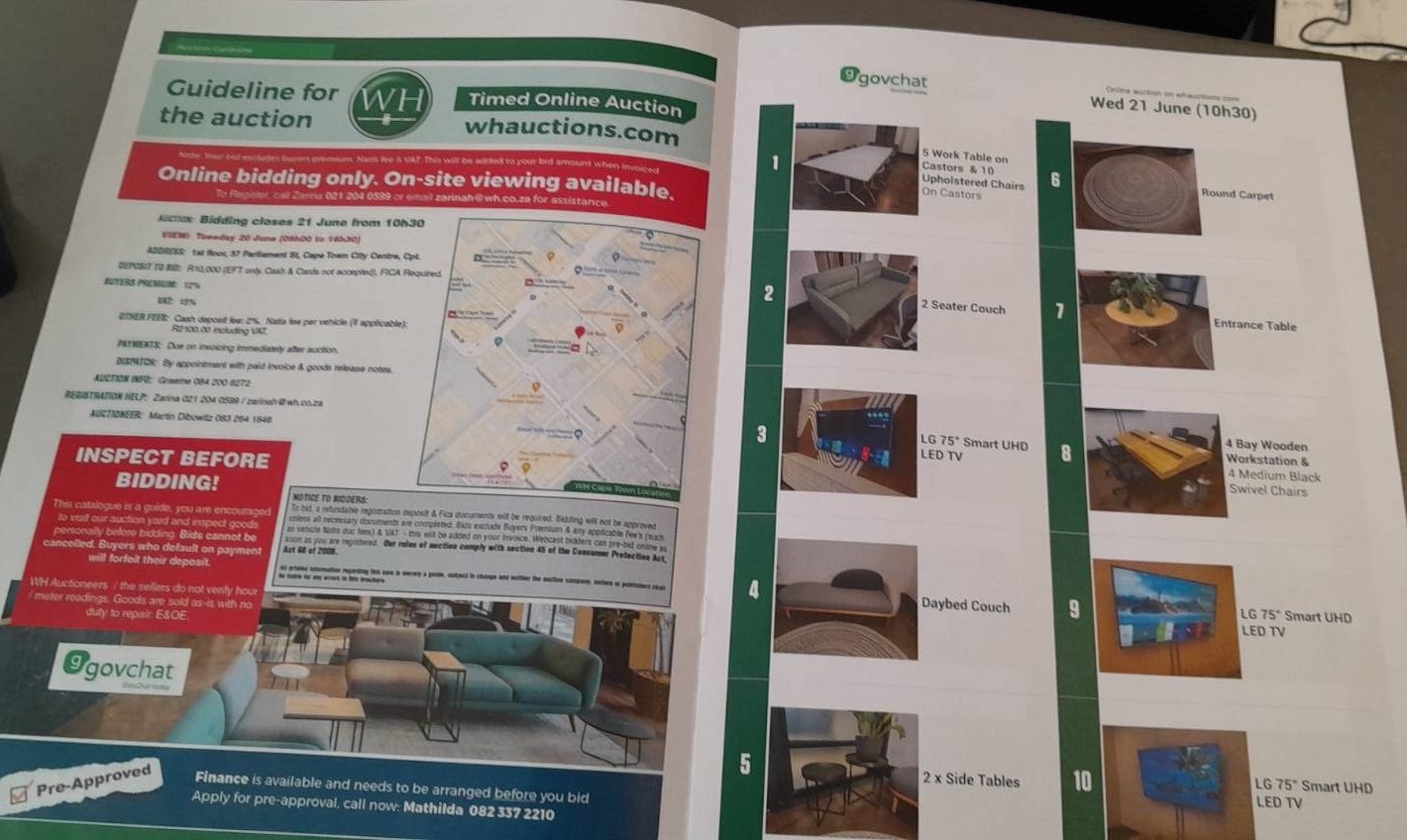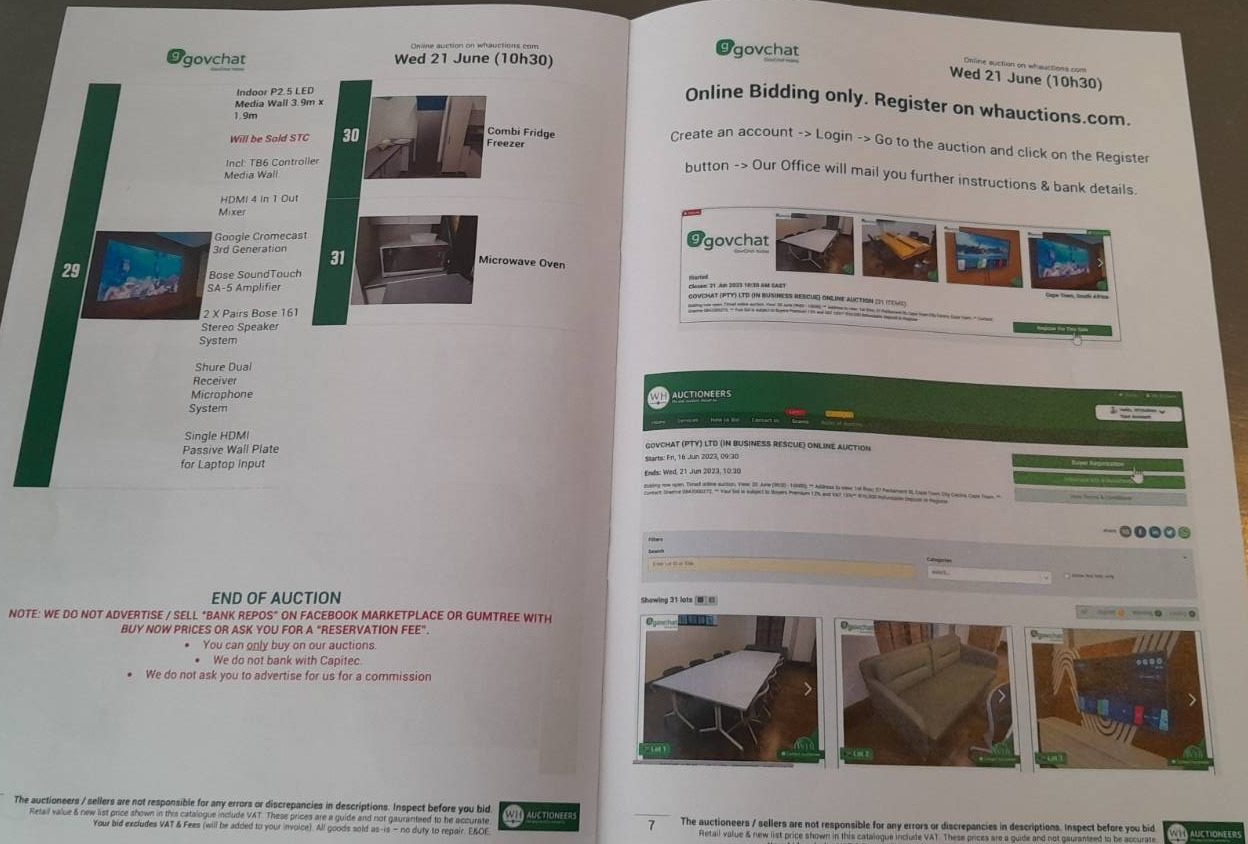OPEN SECRETS OP-ED
Capital Appreciation Ltd and GovChat: Follow the database — Part Two

In the final part of this two-part series, we take a deeper look at the ways GovChat might undergo a commercial revival, who might benefit from ownership of its database, and the implications this may hold for the South African social grants system.
Read Part One here
In Part One we explained the deteriorating business partnership between fintech investment company Capital Appreciation (Capprec) and local tech company GovChat (Pty) Ltd. The failed negotiations between Capprec and GovChat led to Capprec’s successful application to have GovChat placed in business rescue.
Despite this, GovChat still provides the R350 SRD WhatsApp application portal to the South African Social Security Agency (Sassa), free. Despite GovChat having no sources of revenue, Capprec still believes it can become commercially viable.
On GovChat’s official website, the story of its beginnings goes like this: in April 2018, Eldrid Jordaan was out of luck and money after placing everything into creating GovChat as a digital tool to connect citizens with local government and services.
He was on the brink of deserting the GovChat project when a mysterious angel investor intervened. This mystery investor had been following the development of Jordaan’s project on social media and reached out to offer him R10-million in funding to continue GovChat.
This would be enough money to allow GovChat to sustain itself until it received further funding from Capprec, which would later become its primary investor. Though Jordaan has publicly stated that he “did not know this person from a bar of soap”, GovChat’s R10-million saving grace came from Dewald Dempers, former CEO of AfroCentric Investment Corporation Ltd.
Today, GovChat is in financial trouble again, but Eldrid Jordaan has resigned as CEO and no longer forms part of the company’s management. The company requires an estimated R70-million to repay its debts, and Capprec has expressed reluctance to fully rescue GovChat with further investment.
However, Capprec has agreed to “drip-feed” funds to GovChat to keep it going during the business rescue process. Capprec also sought out a prominent business rescue firm – Matuson & Associates – to handle GovChat’s affairs under business rescue.
This firm has handled high-profile cases before, including the business rescue of Optimum Coal Holdings, the company that operates Optimum Coal Mine which provides coal to three of Eskom’s power plants.
Capprec’s financial commitment reinforces the firm’s belief in GovChat’s commercial viability. In its court papers applying to place GovChat under business rescue, Capprec makes it clear that it still views GovChat as possibly becoming profitable and generating revenue sufficient to cover its operating costs.
However, GovChat is going to need another saving grace – this time far more than R10-million – for Capprec to salvage anything.
In May 2023, Lance Schapiro, the Matuson & Associates representative who was appointed GovChat’s business rescue practitioner (BRP), sent an update on GovChat’s business rescue proceedings to creditors. In it, he announced that GovChat’s office space had become redundant.
On 21 June 2023, the sale of GovChat’s furniture and office equipment took place via an online auction. The proceeds of this auction would cover GovChat’s ongoing operating costs.

GovChat Auction Papers (Photo: Open Secrets)

GovChat Auction Papers (Photo: Open Secrets)
All the while, GovChat continues to provide a WhatsApp application portal for R350 SRD grant applications and appointments for assessments needed for the disability grant.
As explained in Part One, Capprec may be reluctant to provide GovChat with more investment, but it also stands to gain GovChat’s intellectual property if GovChat is unable to pay back its debts. This would place Capprec in a primary position to capitalise on GovChat’s data and systems linked to its work for Sassa.
GovChat’s considerable reach to millions of South Africans adds to its appeal to Capprec. In past interviews, Capprec CEO Bradley Sacks hinted that GovChat may potentially get involved with the payment of social grants.
As Sassa and the Department of Social Development (DSD) continue to struggle to find a partner that can bring stability to the payments administration of grants, could GovChat’s revival lie in stepping into this arena? Who else may hold a stake in GovChat making a comeback?
This part of the series explores these questions and what this may mean for South Africa’s future social grants space.
Who else holds a stake in the GovChat pie?
In early 2023, Eldrid Jordaan attempted to buy GovChat from Capprec.
ITWeb reported that Jordaan and a company called K2018 offered Capprec R50-million to regain control over GovChat. The absence of media fanfare and non-acknowledgement of this offer by Capprec suggests it was declined.
In response to a set of written questions sent by Open Secrets to Matuson & Associates, Lance Schapiro confirmed that Eldrid Jordaan had resigned as a director of GovChat in February 2023 but remained an indirect shareholder through K2018.
Company documents obtained by Open Secrets show that Jordaan is currently the only active director of K2018. The company does not appear to have a website and the documents reveal its address is located in the suburb of Belhar, Cape Town.
However, the court papers in Capprec’s business rescue submissions included an annexure of a 2019 Shareholders Agreement between Capprec, K2018 and GovChat. In the agreement, K2018 is also referred to as “Newco”. However, both entities share the exact company registration number, making it the same company.
The document names Eldrid Jordaan, Goitse Konopi, Dewald Dempers, a company named Metcalfeorganism (Pty) Ltd, and the Haslam Family Trust as the shareholders of K2018 at the time the shareholders’ agreement was signed in May 2019. Company documents show that Metcalfeorganism’s directors are Barend Johannes Booysen and Carel Hoffman.
There is little public information about the Haslam Family Trust, but the name suggests it may be connected to GovChat’s former finance and commercial director, Tandi Haslam.
It is unclear whether any of these parties were involved in K2018’s R50-million bid to regain control of GovChat. What is evident is that the bid indicates that Capprec is not the only other party that holds a key stake in GovChat’s commercial success.
Are social grants the key to GovChat’s commercial revival?
Where is the DSD and Sassa in all of this? In a written response, Lance Schapiro informed Open Secrets that “the relevant government departments are aware of the business rescue as well as the risks associated with it”.
He clarified that none of the service agreements GovChat secured prior to its business rescue generated any revenue. And yet, Capprec entered into a post-commencement finance agreement to ensure that GovChat would have the required operating costs needed while in business rescue, and that it can continue to pursue its ongoing legal battles with Meta.
The continued investment suggests that Capprec still believes it can make a buck out of GovChat.
The question is how?
In its March 2023 update on GovChat’s business rescue proceedings, Matuson & Associates informed GovChat’s stakeholders that it had sent letters to both the Department of Cooperative Governance and Traditional Affairs (Cogta) and the DSD on GovChat’s present financial situation.
The update further states that “without an injection and/or financial contribution to operational funding, GovChat may find itself in a situation where it can longer afford to carry the cost of operating the platform without some financial contribution from the parties who are currently using it.”
Simply put, the services that came at no cost to Sassa and the DSD may soon no longer be free. Offering platform technology services to governments could prove to be a lucrative venture. In many ways, the contention of which tech company will be favoured to do so is at the core of the competition dispute between GovChat and Meta and WhatsApp.
In its submissions to the competition tribunal against Meta’s off-boarding of GovChat from the WhatsApp platform, GovChat argued that Meta was abusing its dominance in the market of providing government messaging services in South Africa.
The question is which government contracts might GovChat be in the best position to monetise in relation to Capprec’s core businesses? Capprec has made it no secret that “payments is in their DNA”, and with GovChat already a key SRD grants application partner, this may place it in a good position for more contracts down the line. What is even more foreboding is the fact that, presently, South Africa’s social grants payments administration is going through another crisis.
From November 2022 to September 2023, reports of grant recipients not having been paid on time, or at all, consistently made the news. Postbank has regularly reported “technical glitches”, although these were often left undefined.
In a previous series, we detailed Postbank’s failure to pay social grants, its inadequate governance and controls, and raised questions on the lack of transparency by Sassa, SA Post Office and Postbank on the crisis of administering social grants payments.
On 12 September 2023, all but one Postbank board member resigned following an investigation by KPMG that amplified concerns about payments of grants.
On 23 September 2023, the DSD and Sassa addressed Parliament’s Portfolio Committee on Social Development on the challenges facing Postbank. The presentation detailed how Postbank’s system failure resulted in grant recipients being unable to access their payments, and some having deductions from their bank accounts due to failed withdrawal attempts.
Though the issues were resolved and grant recipients were eventually able to receive their grants, the entire debacle emphasised Postbank’s inability to be Sassa’s partner to distribute grant payments.
As explained in Part One of this series, GovChat partnered with Sassa to provide the R350 SRD WhatsApp grant application portal through no formal procurement process. In our investigation, Open Secrets raised the concern that by providing its services to Sassa free, GovChat may be positioning itself to be the favoured partner for any future contracts that the state entity may offer.
With GovChat needing to generate revenue quickly to avoid liquidation, and Capprec having hinted at a future in grants’ payments distribution, could this be where Capprec sees GovChat’s commercial revival? It remains to be seen, and government is adamant that Postbank must be used.
Whatever the outcome, protecting the constitutional rights of social grant recipients must come first.
The private sector must not be allowed to profit from social grants
Net1 and CPS’ unbridled access to the financial data of grant recipients was used without the informed consent of grant recipients to make millions of rand in profit for Net1’s subsidiary companies.
Millions of social grant recipients across the country suffered unlawful deductions from their grants because of this profiteering.
In 2017, the Constitutional Court ruled that Sassa had a duty to protect the personal information of grant recipients and that their data must be used for no other purpose than for the payment of grants. Though the judgment concerned the CPS contract, it is one that must be upheld in all future contracts involving social grants.
As stated by the Black Sash: “Appropriate measures must be put in place in the current partnership between Sassa and the South African Post Office and any future partnership, so as to make sure that beneficiaries’ personal information is properly protected and to make sure that beneficiaries’ grants are not preyed upon by unscrupulous lenders who get access to beneficiaries’ personal information.”
In its current agreements with GovChat, it is unclear to what extent the personal information of social grant recipients has been properly protected by Sassa as dictated by the Protection of Personal Information Act, although GovChat told Open Secrets in 2021 that it only used anonymised data.
If GovChat is unable to repay its debts to Capprec, all of its intellectual property and rights – including its SRD WhatsApp application platform – will become Capprec’s. This will affect the millions of South Africans who use the GovChat platform and the millions of potential grant recipients whose information filters through its platform.
Conclusion
As GovChat remains in business rescue and is seeking financial backers to turn it around, Capprec still hopes that it can become profitable. Capprec also holds the potential trump card of GovChat’s intellectual property that it stands to inherit from GovChat.
The extent to which Eldrid Jordaan and his partners at K2018 will gain a stake in the commercial revival of GovChat remains to be seen. As Sassa and the DSD face a continuing crisis with the administration of social grant payments, any possible new partners must be scrutinised.
The dire consequences that stemmed from Net1 and CPS’ unlawful deductions must never be repeated.
Capprec’s intent to turn GovChat into a commercial entity and its leadership’s hints about entering the world of grant payments should be a warning that the public must keep a close eye on the future of our social grants system. DM
Open Secrets is a non-profit organisation which exposes and builds accountability for private-sector economic crimes through investigative research, advocacy and the law. To support our work visit Support Open Secrets.


















 Become an Insider
Become an Insider
Comments - Please login in order to comment.